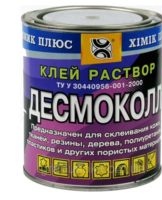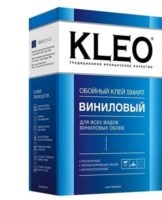Guidelines for choosing waterproof tile adhesive for swimming pools and overview of popular brands
The lining of the pool is made using specialized compounds that do not allow moisture to pass through. Swimming pool waterproof tile adhesive is specially designed for wet areas and places in contact with liquids. There are several types of solutions on the market, so when choosing, you should familiarize yourself with the detailed characteristics.
Content
- 1 Basic Requirements for Pool Tile Adhesive
- 2 Varieties of suitable formulations
- 3 Selection features
- 4 Influence of the operating mode
- 5 Chlorine resistant
- 6 What else should you pay attention to when choosing
- 7 Review of popular brands
- 8 General rules and instructions for use
- 9 How to calculate consumption
- 10 Additional tips and tricks
Basic Requirements for Pool Tile Adhesive
The composition of tiles placed under water must meet a number of requirements. The list includes:
- Increased adhesion for secure attachment of the tile to the substrate without the risk of subsequent displacement from its original position.
- Elasticity necessary to neutralize the load to which the material is subjected during finishing.Load refers to various deformations caused by external and internal factors.
- Resistance to prolonged contact with liquid is a basic requirement, which is important due to the constant presence of water in the bowl. The effect of pool water on an adhesive solution is very different from short-term contact.
- Inert to chlorine and chemicals, which are used for cleaning and compliance with sanitary and hygienic rules. The composition of the water in the bowl depends on the method of disinfection, so the glue should be insensitive to basic substances.
- Increased resistance to heat and frost, since the temperature of the liquid fluctuates in the range of 15-30 degrees, and in open structures it can freeze.
- Presence of antifungal characteristics necessary to prevent the development of harmful organisms.
Varieties of suitable formulations
Several types of adhesives have been developed for lining the pool, which differ in consistency, the method of preparing the working mixture, the form of release and other indicators. When choosing a suitable option, it is worth studying the characteristics in detail and comparing the varieties with each other.
Epoxy
Epoxy compounds are intended for interior decoration, in particular for laying tiles or mosaics in the swimming pool. The solutions are environmentally friendly, do not have an unpleasant odor and can accommodate only small and relatively light tile options. You can use epoxy mixtures when installing tiles on various surfaces. The working mix is suitable for working on concrete, metal and wood substrates due to its high adhesion rate.
Latex
Latex glue, also called dispersion glue, is a water-based mixture.The composition may contain synthetic resins, alcohols and various inorganic fillers. A specific composition is intended for specific purposes. Therefore, when lining the pool, you must select a solution for the installation of ceramic tiles.
Solutions in the latex category are made with natural or synthetic rubber. The second option is in practice more durable and versatile. Most latex adhesives do not have a strong smell, and when they harden, they completely disappear.
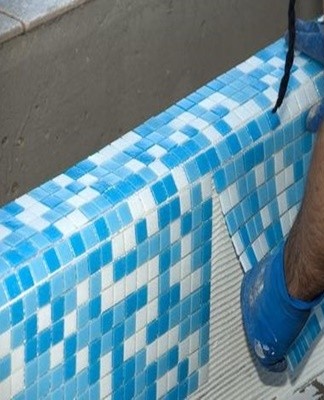
Acrylic
The name acrylic solution is associated with the various acrylic compounds that serve as the base. A common option is a solvent-based acrylic suspension adhesive. When the solution comes into contact with air, the solvent evaporates, causing solidification.
The acrylic mixture is produced in various forms. There are one-component and two-component, thick and liquid compositions. A modified version based on polyacrylates, capable of hardening under the influence of ultraviolet rays, is also in demand.
Polyurethane
Polyurethane compounds are well suited to perform the function of a waterproofing layer, therefore they are often used for coating pool bowls. The glue is able to maintain characteristics at temperatures from -50 to +120 degrees. The particularly high resistance, combined with the absence of creep, makes it easy to withstand the pressure generated by water.
Selection features
The choice of adhesive is also influenced by the type of base and the material itself that is used for the coating of the pool bowl. Mortars differ in adhesion strength to different surfaces, therefore specific formulations are provided for each base.At the same time, there are universal options on the modern market.
Ceramic
The adhesive for laying ceramic tiles should be moderately plastic and have a high flow rate. When applied, the solution fills all existing voids so that the tile does not fall off the base and does not break when exposed to external influences. Most often, ceramic tiles in the pool are fixed with dispersion or epoxy glue.
glass mosaic
The prevalence of glass mosaics in pool liners is associated with material hygiene, wear resistance and immunity to household chemicals. The presence of a large number of seams after installation gives the surface non-slip characteristics. A universal option for installing glass mosaics is a cementitious adhesive solution.
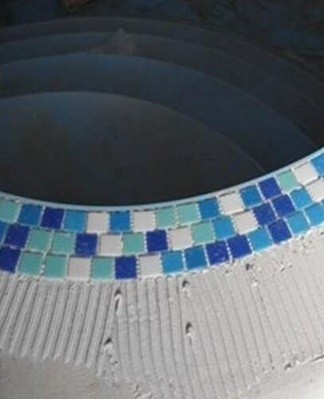
Concrete, stone or brick
When working on hard surfaces, it is recommended to use an epoxy or furyl adhesive. It is important that the composition retains its characteristics for 1-4 hours and is not covered with a film within 20 minutes after application. The result of the work should be a strong fixation of the material and the absence of slippage on the surface.
Polymer materials
Adhesive for polymeric materials is a composition in which a polymer and substances having a fixing property are present. Of the solutions produced for lining the pool with tiles, most are polymer-mineral composites consisting of a cement-sand mixture and additional components.
The main advantage of polymer compositions is the increased level of adhesion. The only drawback is toxicity, therefore, protective equipment should be used when working.
Plastic
The presence of plastic elements in the pool complicates the coating process. Plastic is less susceptible to sticking than a number of other materials, due to the surface structure, special chemical composition and other properties. Several types of specialty adhesives have been developed to work with plastics, including reactive, liquid, contact, and hot melt adhesives.
Influence of the operating mode
If the pool is open, a frost resistant glue will be needed to finish it. Even in the absence of liquid in the bowl in winter, tiles with an adhesive composition are affected by low temperatures. The property of frost resistance is given to the glue by special components, which form a structure that does not undergo expansion during hardening.
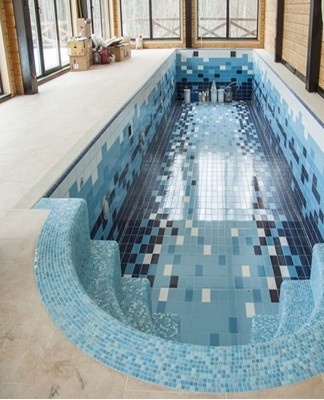
Chlorine resistant
For the permanent disinfection of water in many swimming pools, chlorination is carried out. For this reason, the adhesive must be resistant to this substance. A common option is Ardex X77, a fast-curing, highly elastic, fiber-reinforced compound.
What else should you pay attention to when choosing
When choosing a suitable composition, you should also take into account the brand of glue, the speed of hardening, the need to prepare a working mixture. An integrated approach to the choice will help you find the best option, taking into account individual conditions.
Review of popular brands
After reviewing the rating of popular formulations, you can select the desired option from the provided list. The products of the considered manufacturers have been repeatedly tested in practice and have proven themselves in the market.
"Farvest C2TE25 swimming pool"
A thin-layer composition from the manufacturer "Farvest" is created on the basis of a cement-sand mixture and is suitable for finishing with mosaic and ceramic tiles, as well as stone materials. The composition is resistant to moisture and does not lose its characteristics in the temperature range from -50 to +60 degrees.
"Pool TM-16 wins"
A multicomponent dry composition of the Pobedit brand based on quartz sand and a mixture contains additional modifying components for laying ceramic tiles. The adhesive creates a strong bond and the curing of the hardened mortar ensures the durability of the pool coating.
ICP Collastic
PCI Collastic two-component mortar based on polyurethane has a number of comparative advantages. These include:
- the presence of waterproofing features;
- no need for preliminary priming of the surface;
- grouting between tiles is allowed after 6 hours;
- neutralization of base deformation stresses.
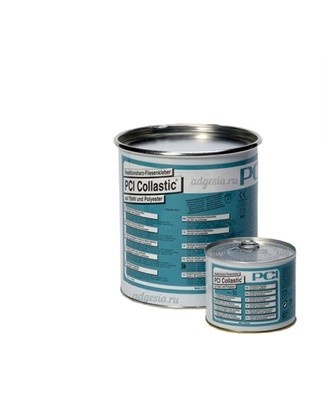
PCI Nanolight
PCI Nanolight elastic composition is developed on the basis of nanotechnology and is suitable for laying tiles on any type of substrate. The glue has an increased degree of resistance to liquids, inertness to chlorine and salts, and the ability to operate in a wide temperature range.
SM-16
CM-16 is reinforced with microfibers and is suitable for all types of tiles. The adhesive is suitable for use in heated pools and is compatible with sealant materials. Additional advantages include environmental friendliness, resistance to deformation and increased elasticity.
SM-17
It is possible to use CM-17 glue in both open and closed pools due to the wide operating temperature range.The mortar creates an elastic bond, prevents the tiles from slipping and is suitable for tiling the bowl with a large-sized coating.
SM-117
SM-117 Dry Building Mix is used in indoor and outdoor pools. Before use, it is necessary to prepare a working mixture by mixing it with a liquid. The ready-to-use mortar has high adhesion and reliably fixes the tiles without the risk of displacement from the original position.
"Eunice's Pool"
Eunice Compound is recommended for finishing difficult surfaces, including heated substrates and old tile coverings. After curing, the solution is able to hold ceramic, mosaic, stone and porcelain tiles.
Ivsil Mosaic
Ivsil glue is specially designed for mosaics. The composition can be applied to the surface of a concrete base or to an old tile, which avoids dismantling the old coating.
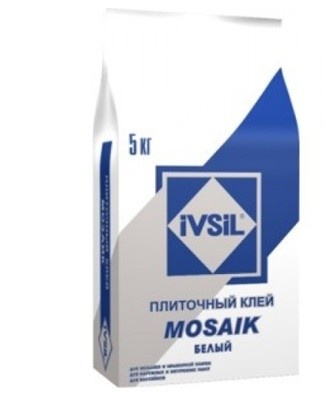
CM-115
The CM-115 building mixture does not allow the tiles to move and stain the coating. The composition is environmentally friendly, suitable for heated pools and resistant to temperature extremes.
"Basera Maxiplix T-16"
Reinforced glue "Osnovit" is suitable for mounting any tile, regardless of the type of base. The mortar provides maximum bond strength and prevents the coating from slipping.
Tenaflex H40 ("Keracoll")
The flexible and environmentally friendly compound Tenaflex H40 is used for laying tiles on stable, non-absorbent substrates. In particular, the solution makes it possible to fix the material on the waterproofing layer or on the old coating.
40 Eco Flex
H40 Eco Flex mineral adhesive is designed for high resistance tiles. The composition demonstrates high efficiency at high base deformation loads.
General rules and instructions for use
The basics of using waterproof glue differ little from using conventional formulations. During the coating process, apply a sufficient amount of adhesive suitable for the material being used. It is important that after applying the mortar and laying the tiles, contact with water occurs no earlier than 6 hours.
How to calculate consumption
The exact consumption of the composition depends on the specific brand and the thickness of the applied layer. As a rule, the manufacturer indicates the consumption of the substance on the packaging with glue.
Additional tips and tricks
Before using the glue, you should always carefully study the rules of use. Following the instructions will help avoid a number of mistakes.

